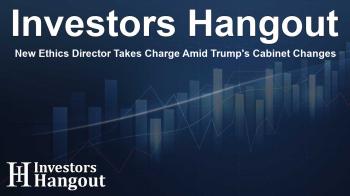New Ethics Director Takes Charge Amid Trump's Cabinet Changes

New Ethics Director Takes Charge
As Donald Trump’s administration prepares for a significant transition, a new figure steps into a vital role—the Director of the Office of Government Ethics (OGE). David Huitema, who recently took over this position, is tasked with a crucial responsibility: overseeing the ethical standards of incoming officials. With the inauguration approaching, this role takes on heightened importance.
Understanding the OGE's Role
The OGE serves an essential function in ensuring that government employees prioritize the public's interest over personal financial gain. Its mission revolves around maintaining transparency and integrity within federal agencies, especially during a presidential transition. Huitema emphasized that the ultimate goal is to safeguard the decision-making process from any conflicts of interest.
Challenges Ahead for the New Director
Huitema's arrival at the OGE comes with considerable challenges, particularly given the historical context of ethics issues within the Trump administration. His predecessor, Walter Shaub, had a tumultuous tenure, highlighting the complexities at play when high-profile nominees enter government positions. As Huitema reviews the financial disclosures of cabinet picks, he must delicately navigate potential conflicts.
Expectations for Financial Disclosures
One of Huitema's immediate tasks is ensuring that nominees adhere to financial disclosure requirements. This process is crucial, as it allows for transparency regarding any interests that could interfere with their official roles. Typically, nominees are required to submit comprehensive financial reports to help the OGE identify any issues before Senate confirmation hearings.
The Importance of Ethical Standards
In his efforts to establish ethical guidelines, Huitema aims to foster a culture of integrity among incoming officials. He acknowledges that many government employees are committed to upholding ethical standards, yet there are challenges posed by differing backgrounds, particularly those transitioning from the private sector.
Teaching Ethics and Navigating Conflicts
In a candid conversation, Huitema expressed hope that ethics can be effectively taught. He recognizes the mindset that some business professionals bring into government—one that may prioritize personal benefit over public service. To bridge this gap, ethical training is vital to instill the right values in new officials, ensuring they understand their responsibilities.
Transparency and Public Trust
Huitema also stressed the significance of public involvement in monitoring government ethics. The OGE makes financial disclosure reports accessible to the public, reinforcing a collective responsibility to uphold ethical standards. This openness is intended to build trust and allow citizens to scrutinize potential conflicts of interest effectively.
Addressing Conflicts of Interest
When it comes to potential conflicts, Huitema explained that it’s essential for officials to be aware of their obligations. If a conflict arises, the law stipulates the necessary steps to address the issue. The DOJ also plays a critical role in potential prosecution should serious violations occur. Huitema collaborates closely with agency ethics officials to resolve any concerns as they emerge.
Moving Forward with Confidence
As Huitema embarks on this new journey, his views on ethics suggest a commitment to navigating the complexities of governance with integrity and transparency. His proactive approach aims to set a standard for incoming officials, emphasizing the importance of ethical conduct in preserving democratic principles.
Conclusion: A New Era of Ethics
In conclusion, David Huitema’s leadership at the OGE marks a new chapter in U.S. governance, concentrating on accountability and ethical behavior. With the full support of ethics officials and public involvement, his administration seeks to uphold the moral framework necessary for effective governance in the years to come.
Frequently Asked Questions
What is the main role of the Office of Government Ethics?
The OGE's primary responsibility is to prevent conflicts of interest among federal employees, ensuring they act in the public interest rather than for personal gain.
How does financial disclosure work for nominees?
Nominees for government positions are required to submit detailed financial reports to the OGE to identify potential conflicts before their Senate hearings.
Why is David Huitema’s role particularly important now?
Amidst a significant presidential transition, Huitema's oversight is crucial for evaluating the ethical standards of new appointees in Trump’s administration.
Can ethics be effectively taught to government officials?
Huitema believes in the potential for ethics training, particularly for those coming from the private sector, to help them adapt to governmental expectations.
What happens if a conflict of interest is identified?
If a conflict arises, the OGE works with agency ethics officials to resolve the issue, and serious violations may lead to prosecution by the DOJ.
About Investors Hangout
Investors Hangout is a leading online stock forum for financial discussion and learning, offering a wide range of free tools and resources. It draws in traders of all levels, who exchange market knowledge, investigate trading tactics, and keep an eye on industry developments in real time. Featuring financial articles, stock message boards, quotes, charts, company profiles, and live news updates. Through cooperative learning and a wealth of informational resources, it helps users from novices creating their first portfolios to experts honing their techniques. Join Investors Hangout today: https://investorshangout.com/
Disclaimer: The content of this article is solely for general informational purposes only; it does not represent legal, financial, or investment advice. Investors Hangout does not offer financial advice; the author is not a licensed financial advisor. Consult a qualified advisor before making any financial or investment decisions based on this article. The author's interpretation of publicly available data shapes the opinions presented here; as a result, they should not be taken as advice to purchase, sell, or hold any securities mentioned or any other investments. The author does not guarantee the accuracy, completeness, or timeliness of any material, providing it "as is." Information and market conditions may change; past performance is not indicative of future outcomes. If any of the material offered here is inaccurate, please contact us for corrections.
